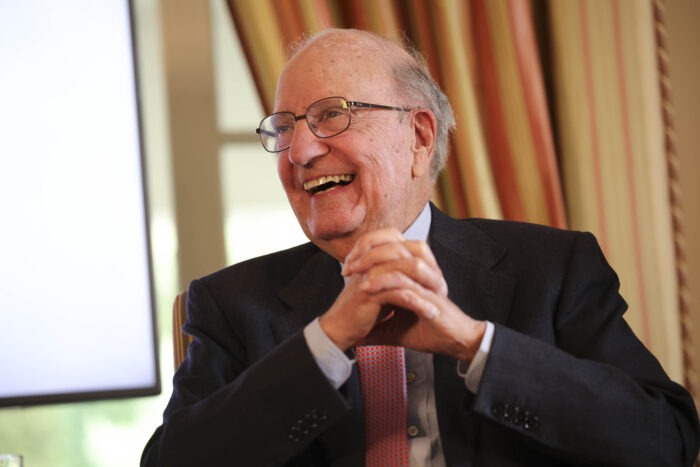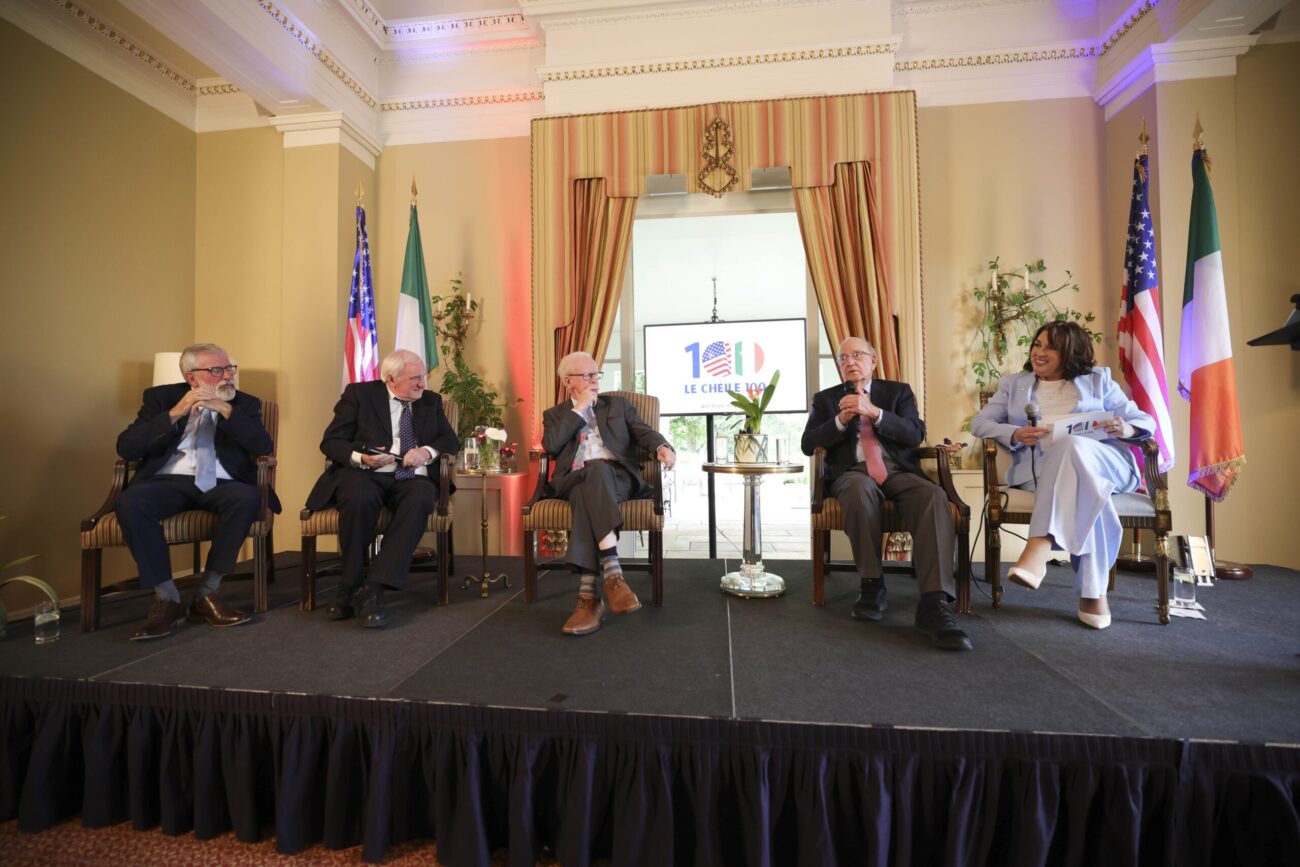It was called “a reunion of The Band” by the function’s host, the US Ambassador to Ireland Clare Cronin. Four of the main players from the peace process were her special guests at an event in her Phoenix Park residence last Tuesday.
The oldest member of the group, Senator George Mitchell, had travelled the longest distance, arriving from the United States. He will be 91 in August. In the 1990s, he spent five years working in Northern Ireland, culminating in his role as chairman of the Good Friday Agreement negotiations.
Next in terms of seniority was Sir Reg Empey, a former leader of the Ulster Unionist Party. He will be 77 in October. The former Sinn Féin president, Gerry Adams, also an October baby, is one year younger than Empey. Bertie Ahern, coming up to his 73rd birthday in September, is the youngest of the quartet.
As they reminisced before an invited audience, they name-checked four deceased participants from that cycle of what at times seemed unending negotiations – Martin McGuinness, John Hume, Seamus Mallon and David Trimble.
Ambassador Cronin was in the chair as moderator. Awareness of the march of time may have influenced the responses of her guests. Each one left caution outside the door. Candour made it a memorable night.
A surprise package with no regrets
Reg Empey was the surprise package. Many people south of the border wouldn’t be familiar with him or his mild-mannered ways. His father was originally from Co Louth but the family settled in Northern Ireland and became successful retailers. Reg became involved in the Ulster Unionist Party while studying at Queen’s University. He had a business in Belfast’s Royal Avenue that was blown up during the Troubles. A relation, 89-year-old Walton Empey, once served as the Church of Ireland Archbishop of Dublin. Ireland’s current ambassador to Mozambique, Patrick Empey, is another connection.
After the DUP overtook the UUP as the dominant voice of unionism in 2003, David Trimble’s leadership and patience were under the kosh. Empey, a leading figure in the party, stayed loyal to him but when Trimble stood down in 2005, he took over.
It was a poisoned chalice. He stayed in the role until 2010. In the 14 years since, five different leaders have tried and failed to halt the UUP’s decline.
Ambassador Cronin wondered if Empey had mixed feelings about the way the UUP had been marginalised by the peace process. He was unequivocal in his response. He would do the same again. He referred to the almost 3,000 killed and many thousands more injured and maimed during the 25 years before the 1998 Good Friday Agreement and then spoke of the dramatic fall in those numbers during the 25 years since. Whatever the impact on the UUP’s fortunes, it was worth it.
Empey said support for the UUP may be on the turn. The party currently has no Westminster MP but Robin Swann’s work as health minister during the Covid pandemic might help him to take the South Antrim Westminster seat from the incumbent, the DUP’s Paul Girvan. But even if there is no success on July 4, Empey has no regrets about what the Ulster Unionist party did in support of peace.
Back doors and heroic figures
Gerry Adams was asked by Ambassador Cronin about the role of Bill Clinton, the US President who appointed George Mitchell as Special Envoy to Northern Ireland in 1995 after he had clocked up six years as Senate majority leader.
The former Sinn Féin leader said President Clinton and his wife, Hilary, were politically and emotionally committed to the peace process. He then began telling stories about how he was sneaked in and out of the building where he was sitting, the US ambassador’s residence, in the 1990s.
Jean Kennedy Smith, a sister of Senator Ted Kennedy, John Fitzgerald Kennedy and Bobby Kennedy, was the ambassador at the time. Fr Alex Reid, the Co Tipperary-born Redemptorist priest, was the link between Adams and the ambassador. Members of the late Fr Reid’s family were among the invited audience on Tuesday night. Adams looked towards some of them in the front row as he told them how their relative was one of the most heroic figures of the peace process.
Making mistakes, deepening dialogue
Senator George Mitchell told of one of the major mistakes he made soon after he arrived in Belfast. He, along with the former Finnish president, Harry Holkeri, and retired Canadian general, John de Chastelain, were given the job of trying to resolve the issue that was stalling political progress – the decommissioning of weapons by paramilitary organisations. In his first meetings with the different political groupings, he promised he would stay and listen to them for as long as they wished to talk. There were times when he regretted making that undertaking.
After three years, Mitchell was given the role of chairing a talks process designed to find a comprehensive peace agreement.

On Tuesday night he gave details of what he considered an ingenious idea from that time and attributed it to British and Irish officials. He name-checked a former Irish diplomat, David Donoghue, who was in the audience. Rather than confine the negotiations to the main parties, smaller groups were made welcome too. By bringing more voices to the table, the quality of the dialogue was deepened.
Mitchell gave credit to the work done by the likes of David Ervine and Gary McMichael to get buy-in from loyalist paramilitary organisations. He said the Women’s Coalition, led by Pearl Sagar and Monica McWilliams, was challenged by unacceptable behaviour from some of the participants but that their contributions added to the quality of the eventual agreement.
George Mitchell’s wife was in the front row, listening to her husband recalling his work in Ireland. Their daughter, Claire, sat alongside her. They named her after Claire Bowes, a teenager who was blinded by shrapnel in the August 1998 Omagh bombing. She made a deep impression on George Mitchell in his dealings with her.
Reg Empey made a very personal intervention in the conversation. He remembered the time in October 1997, when the discussions had hit one more roadblock and George Mitchell left Belfast for New York to be present at the birth of his son, Andrew. At the time Mitchell was losing hope in the negotiations. He made a transatlantic call and discovered that 61 babies had been born in Northern Ireland on the same day as his son. For their collective future, his wife encouraged him to return to Ireland. Empey thanked Heather Mitchell and her family for the sacrifices they had endured.
A room falls silent
The former Ulster Unionist party leader then made a deeper dive. Empey recalled how in Holy Week, 1998, the talks were on the point of collapse. George Mitchell had set a deadline. Some parties, the UUP included, were stalling. Bertie Ahern had to leave for Dublin because his mother, Julia, had died. “You came back from waking your mother to the talks at a critical time,” Empey said to the former Taoiseach.
Upon hearing this, the audience in the room, and the equally full one beyond it, were silent. Ambassador Cronin stumbled in her attempt to find the appropriate words. It was because Empey’s observation had brought back memories of the passing of her father, who had died around that same time and the memories of loss and love had come back.
Empey has been dealing with his own grief in recent times. His wife, Stella, died last October after a long illness.
Bertie Ahern then shared some of his experiences about the mechanics of negotiations and peace-making. He explained how participants have to decide if they want things to continue as they are or if they are willing to make agreements that will bring about change. There has to be some sort of buy-in. He was sharing lessons learned from his days as a Minister for Labour, working up industrial relations deals – the techniques that he would use again many times in his career.
One elephant that Ahern may have been alluding to was then brought into the room by Gerry Adams. He mentioned the Middle East and Gaza and said the lesson of Ireland’s peace process is you have to talk to the different sides. He was aware of the setting where he was expressing the view – the home of the US Ambassador to Ireland. He didn’t labour the point. But he obviously had decided to make it.
Political perspective and the long view
The final contribution was left to George Mitchell. He told a story that he had shared many times before. But like what was called the Single Transferrable Speech of John Hume, Mitchell’s account of his background gets better with each telling.
His father was the son of poor Irish immigrants. He was given into the care of an orphanage run by nuns in Boston. As was the practice then, the children were brought to Sunday mass, and afterwards, inside the church, they were made available for adoption to couples willing to offer them a home.
The son of that adopted boy became the most significant international contributor to the ending of conflict in Northern Ireland. He has fought off different versions of cancer several times. There was a sense, that even with George Mitchell’s track record of endurance, he and his fellow panellists may not have such a “reunion of the Band” again.
As with all US ambassadorial appointments to Ireland, Claire Cronin’s tenure is linked to whoever is in charge in the White House.
President Joe Biden knew of her work as the majority leader of the Massachusetts House of Representatives and her standing among the Boston Irish when he offered her the plum job in Ireland.
If Biden loses in November, her stay in Dublin will be over.
The McLaughlin family crest hangs on the wall of her Phoenix Park residence – her paternal grandfather emigrated from Moville in Co Donegal in 1912.
It was Ambassador Cronin’s idea to host a series of events under the “Le Chéile” banner, marking 100 years of diplomatic relations between Ireland and the United States.
Tuesday’s gathering made a compelling case for the importance of perspective and the long view. So much oxygen is currently being absorbed by the winners, losers and implications of local and European elections. But what happened in Northern Ireland in April 1998 and the knock-on consequences is the political success story of our times.


